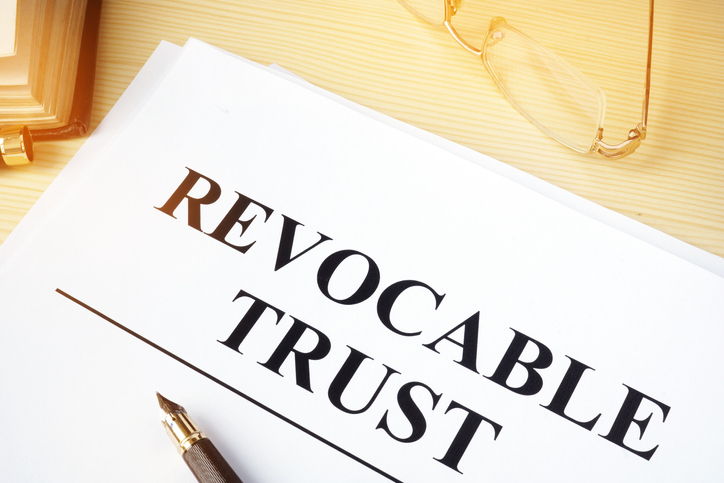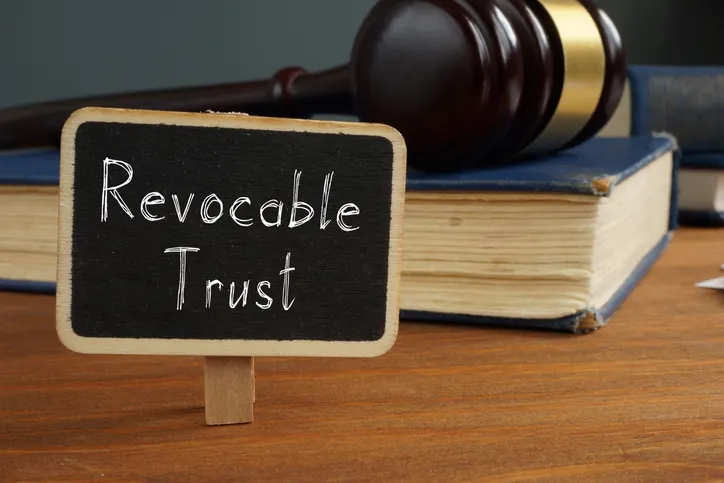Revocable trusts, otherwise known as “living trusts,” do not protect your assets from creditors. In fact, they are subject to collections actions and lawsuits, and they are included when third parties evaluate your personal assets. They do have some advantages however, especially concerning privacy. We’ll discuss how it works.
A financial advisor can provide insights on all aspects of the estate planning process, including trusts, debt, and inheritance laws.
What Is a Revocable Trust?
There are two main types of trusts that individuals and estate planners might establish. The first is known as a revocable, or “living,” trust. The second is an irrevocable trust. While these are not the only types of trusts the overwhelming majority fall under one of these two categories.
With a revocable trust, you are typically both the founder and the trustee. This means that you create the trust and also manage its assets and operations. You have full access to the trust’s terms, beneficiaries, and assets at all times. You can change how the trust operates, who benefits from it, and even dissolve the trust at will. In addition, you can also take assets back out of the trust as you see fit.
This is by contrast with an irrevocable trust, in which you can do none of this. Where a revocable trust is properly considered a legal entity that exists as an extension of your financial and estate planning, an irrevocable trust is an entirely independent legal entity. Once it has been created you can neither change the terms of the trust nor access its assets.
Why Form a Revocable Trust?
Revocable trusts are generally used as a form of estate planning. Since this is a legal entity, the trust survives your death. It can then distribute its assets to your heirs without them having to go through the process of probate.
A revocable trust is also useful in case you become incapacitated or otherwise unable to manage your own affairs. For example, if you are a soldier on deployment or are placed in a medical coma.
Can Creditors Access a Revocable Trust?

The answer is yes. A revocable trust is extremely useful as a financial planning tool. Keeping access to the trust’s terms and assets lets you update it as necessary over the course of your life. However, this level of access also makes you the effective owner of the trust and its assets.
This means that courts and creditors can fully access the contents of a revocable trust that you form because its assets are indistinguishable from your own. If you owe money, any assets that you hold in a revocable trust will be considered part of your net worth.
Creditors can seize these assets through collections actions. And courts can order you to pay debts based on what’s in the trust. They are even considered part of your total assets during a bankruptcy proceeding. In short, a revocable trust does not protect assets from third parties.
Why Can Creditors Access a Revocable Trust?
The reason for this is an issue that comes up frequently in the law. In finance, it’s often known as “commingling assets.” In corporate law, it’s known as “the corporate veil” and in employment, it’s called “misclassification.”
In all cases, the theory remains the same. When someone has full control over an entity and can access that entity’s assets at will, then there is no legal distinction between them. If someone uses their small business as a piggy bank, then you can sue them as well as the business for a cause of action. If a company has full control over one of its subsidiaries, then it is also on the hook for that subsidiary’s debts.
The same is true when it comes to revocable trusts.
Because you control the trust and can withdraw assets at will, the law considers you an effective owner of those assets. You can put money in, take money out, spend money freely, sell the property as you see fit and shut down the trust entirely and take all the assets back. You even pay taxes on all income the trust generates. For all practical purposes, you are the owner of these assets. This is true even though the trust is a separate legal entity.
Another way to think about it is from the reverse position. If a revocable trust did protect assets from creditors, any debtor could easily hide their money from third parties. You could go into debt, move all your assets into a trust, default on those debts, then dissolve the trust and claim your money back. That wouldn’t work, and it’s why courts don’t allow it.
Some Irrevocable Trusts Do Protect Assets
While the details are beyond the scope of this article, it’s worth noting that you can protect assets from third parties through the use of some irrevocable trusts. An irrevocable trust is an entirely separate legal entity from its creator. You lose control of any assets that you put into it, subject to the terms of the trust. But those assets are then legally considered no longer yours.
This depends entirely on the jurisdiction and the nature of the trust itself given state laws vary. Some trusts will not work for protecting assets, particularly not if you have named yourself as a beneficiary. Some jurisdictions also don’t recognize this protection at all. However, it is a potentially viable option under the right circumstances. But if the court determines you moved your assets around to keep them away from creditors, it would be considered fraud.
What a Revocable Trust Does and Does Not Protect
A revocable trust helps with asset transfer and management, not creditor protection. Its primary function is to hold property in a legal structure that continues after death, allowing assets to pass to beneficiaries without probate. It also provides continuity if the grantor becomes incapacitated, since a successor trustee can step in without court involvement.
A revocable trust can reduce administrative delay and public disclosure. Assets held in the trust avoid probate, which can be time-consuming and part of the public record. This can simplify estate settlement and limit court oversight, but it does not change ownership for legal or financial purposes during the grantor’s lifetime.
What a revocable trust does not do is shield assets from personal liabilities. Because the grantor keeps control and can revoke the trust at any time, creditors treat trust assets the same as assets held outright. Lawsuits, judgments, and collection actions can reach property inside the trust.
Revocable trusts also do not provide protection in bankruptcy. Assets held in the trust are counted as part of the grantor’s estate when courts evaluate available resources. For debt and insolvency purposes, the trust offers no separation between the individual and the property it holds.
In short, a revocable trust addresses estate administration, not asset protection. It can streamline inheritance and management issues, but it does not block creditor claims or legal actions. Asset protection requires a different legal structure, often involving loss of control and stricter rules.
Bottom Line

A revocable trust does not protect your assets from courts, creditors or other third parties. Since you maintain control over the assets in this trust they are still considered yours and it can be freely seized to pay your debts. However, there are some irrevocable trusts that do protect assets from third parties but the level of protection depends on the state laws where you and/or your assets reside.
Tips for Estate Planning
- If you’re unsure whether a trust belongs in your estate plan, you don’t have to go it alone. Finding a qualified financial advisor who can help doesn’t have to be hard. SmartAsset’s free tool matches you with vetted financial advisors who serve your area, and you can interview your advisor matches at no cost to decide which one is right for you. If you’re ready to find an advisor who can help you achieve your financial goals, get started now.
- Estate taxes can be hefty. But you can maximize inheritance for your family by gifting portions of your estate in advance to heirs. Or you can even set up a trust.
- Some inherited assets can have tax implications. Before you spend or invest your inheritance, read more inheritance taxes and exemptions.
Photo credit: ©iStock.com/Andrii Dodonov, ©iStock.com/designer491, ©iStock.com/Wasan Tita
